Welcome to the July 2024 edition of Phytogen!
With the colder months upon us there are plenty of amazing scientists to celebrate. This issue we have plant-microbe interaction news courtesy from Dr Stephanie Watts-Fawkes
Then, a major part of this issue will spotlight students awardees of the travel grant of the International Plant and Molecular Biology (IPMB) conference held in Cairns last month.
Lastly, we have launched a new section dedicated to highlighting our student members. Our first student contributor is Zane Marks who is the ASPS student representative. If you would like your or your students’ work highlighted in Phytogen and social media, please contact our editors Razlin (razlin.azman@csiro.au) or Lucas (l.auroux@latrobe.edu.au).
Plant-Microbe Interaction Representative
Dr Stephanie Watts-Fawkes
Update from Plant-Microbe Interactions representative
Stephanie Watts-Fawkes
During the 2023 ASPS meeting in Hobart, I had the pleasure of co-chairing the “plant nutrition and beneficial plant-microbe interactions” session along with previous discipline representative, Assoc. Prof. Eloise Foo. We heard from invited speaker Dr Dugald Reid (La Trobe University) who gave us an overview of his research over the last few years on genetic strategies to enhance nitrogen fixation. Later in this article, I will highlight a recent publication from Dr Reid’s research. During the session, we were also presented with research from the rhizobial and mycorrhizal domains by several ECRs including PhD students Karen Velandia (UTAS) and Thi Diem Nguyen (University of Adelaide), and postdoctoral researcher Dr Tess McBride (Western Sydney University). It was a well-received session, and we now look towards planning of the 2024 ASPS satellite meetings.
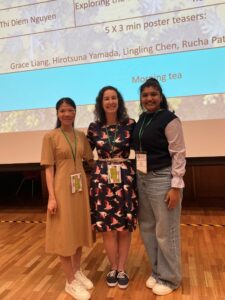
Caption for image: Ms Thi Diem Nguyen, Dr Stephanie Watts-Fawkes, Ms Rucha Patil at the conclusion of the plant-microbe interactions session at ASPS 2023.
In June, there were two landmark publications released by Australian researchers (led by two ASPS discipline representatives) that have made fundamental contributions to our understanding of plant-microbe interactions. A team at Western Sydney University’s Hawkesbury Institute for the Environment including first authors Drs Mingkai Jin and Kristine Crous (environmental ecophysiology representative) published their results from a six-year free air CO2 enrichment study in Nature. They found that a mature Eucalyptus forest subjected to elevated CO2 was phosphorus (P)-limited, due to competition with soil microbes for P, even though the trees were efficient at taking up and using P taken from the soil. This has implications for Australia’s old Eucalyptus forests as atmospheric CO2 continue to rise, with no ‘new’ P being deposited belowground.
In late June, a team led by Dr Dugald Reid (whole plant representative), in collaboration with researchers from Aarhus University, Denmark, published their work to identify and characterise the “fixation under nitrate (FUN)” transcriptional regulator, a ‘switch’ for nitrogen (N) fixation in legumes, in Nature. FUN was initially found through a genetic screen of some 150,000 plants through modulation of soil nitrate availability. The authors found that the activity of FUN, and thus the metabolic activity in root nodules, is dependent on internal zinc (Zn) concentration. A lower Zn concentration in nodules, which occurs when there are higher levels of nitrate in the environment (and less need for N-fixation), activates FUN, which then initiates the breakdown of the nodule. Identification of FUN has implications for designing legume crops that may continue to fix N even when soil N is not limiting, which may improve crop N use efficiency.
In the next few months, Australian beneficial plant-microbe researchers will be heading to the International Conference on Mycorrhiza in Manchester, UK (5th-9th August), and the International Conference on Legume Genetics and Genomics (30th Sept – 3rd Oct) and Australian Nitrogen Fixation Conference (4th – 5th Oct), both in Brisbane. In case you hadn’t heard, for the mycorrhiza enthusiasts the next edition of ICOM will be held in Cairns on the 13th-17th July, 2026, with Assoc. Prof. Jonathan Plett (Western Sydney University) spearheading the organisation of what is sure to be a wonderful event.
Editor’s note: You can read more about Stephanie’s research on the University of Adelaide profile page or follow her on X (@myco_research) for her research updates.
Student travel grant awardees report – IBMP Cairns 2024
Hanh Vo – Utas (TAS)
The International Plant Molecular Biology (IPMB) Congress 2024 was an unforgettable experience. This was an amazing opportunity for me to strengthen current network and made new connections. As someone who is in the last stretch of her PhD project, I had the chance to share my work so far, and talked to possible new employer for my postdoc. Moreover, many students also were also at the conference, which was encouraging and helped me to gain confident for networking. I was lucky to have the ASPS grant to travel and selected
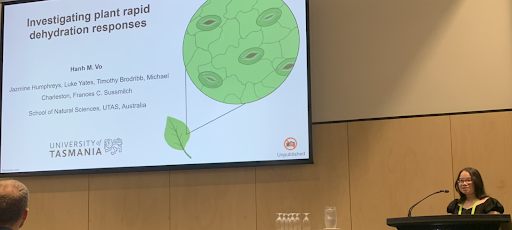
from competitive abstracts to give a ten-minute talk in the “Water, Drought and Heat Stress” session on Thursday. The presentation went well, and I got some good, thoughtful questions after to answer and think about. Overall, I love the opportunity, and would like to thank ASPS for the student travel grant and my supervisors for helping me with the presentation.
Linh Ton – UWA (WA)
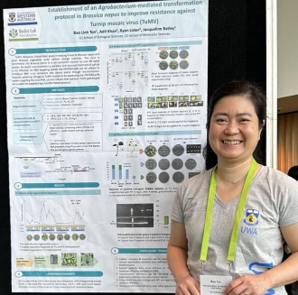 I deeply appreciated the support from ASPS through Travel Grant 2024 and the financial support from GRS-UWA, which enabled me to attend the IPMB 2024 in Cairns. Attending such a huge congress in plant molecular biology at the Cairns Convention Centre was an amazing experience during my PhD journey. It was a great opportunity for me to connect with researchers around the world. I presented my poster on establishing an Agrobacterium-mediated transformation protocol in canola (Brassica napus) to improve resistance against Turnip mosaic virus (TuMV) and had the opportunity to talk to other researchers with a similar research focus. The plenary talks and presentations covered the emerging technologies and current topics in plant molecular biology. I was thrilled to know about the updates on RNA biology studies and their application in plant protection against plant pathogens. I was surrounded by the energetic and stimulating atmosphere until the last talk by Sir David Baulcombe on his lifelong studies on RNA biology. I am looking forward to attending the next IPMB conference, which will be in China.
I deeply appreciated the support from ASPS through Travel Grant 2024 and the financial support from GRS-UWA, which enabled me to attend the IPMB 2024 in Cairns. Attending such a huge congress in plant molecular biology at the Cairns Convention Centre was an amazing experience during my PhD journey. It was a great opportunity for me to connect with researchers around the world. I presented my poster on establishing an Agrobacterium-mediated transformation protocol in canola (Brassica napus) to improve resistance against Turnip mosaic virus (TuMV) and had the opportunity to talk to other researchers with a similar research focus. The plenary talks and presentations covered the emerging technologies and current topics in plant molecular biology. I was thrilled to know about the updates on RNA biology studies and their application in plant protection against plant pathogens. I was surrounded by the energetic and stimulating atmosphere until the last talk by Sir David Baulcombe on his lifelong studies on RNA biology. I am looking forward to attending the next IPMB conference, which will be in China.
Juel Datta – QUT (QLD)
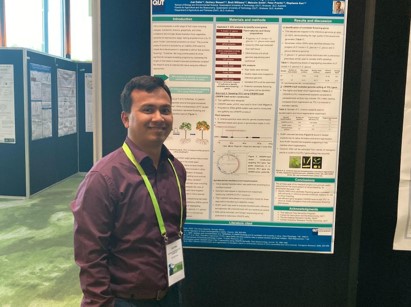 I am in my second year of PhD at the Queensland University of Technology (QUT). My main objective of the PhD research is to understand the molecular mechanisms of juvenility in Citrus using different biotechnological approaches. Recently, I had the opportunity to visit and to present my research as poster at the International Congress on Plant Molecular Biology (IPMB 2024) in Cairns, Australia. To attend the event, I received a travel award from the Australian Society of Plant Scientists (ASPS). The program brought like-minded scientists around the globe to know and share about the current plant molecular research. Undoubtedly, it was a perfect place for networking for the early career researchers and students. The plenary sessions, oral and poster presentations by fellow scientists were outstanding and forward-looking for future opportunities. I am grateful to the host of IPMB, ASPS and QUT for providing a chance to attend such a conference.
I am in my second year of PhD at the Queensland University of Technology (QUT). My main objective of the PhD research is to understand the molecular mechanisms of juvenility in Citrus using different biotechnological approaches. Recently, I had the opportunity to visit and to present my research as poster at the International Congress on Plant Molecular Biology (IPMB 2024) in Cairns, Australia. To attend the event, I received a travel award from the Australian Society of Plant Scientists (ASPS). The program brought like-minded scientists around the globe to know and share about the current plant molecular research. Undoubtedly, it was a perfect place for networking for the early career researchers and students. The plenary sessions, oral and poster presentations by fellow scientists were outstanding and forward-looking for future opportunities. I am grateful to the host of IPMB, ASPS and QUT for providing a chance to attend such a conference.
Ejiro Evivie – ANU (ACT)
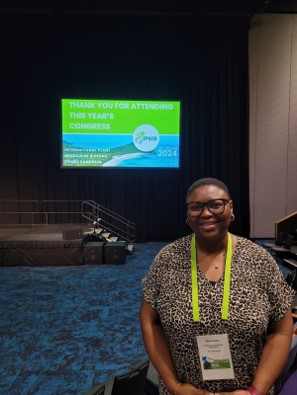 LinkedIn: Ejiroghene Evivie
LinkedIn: Ejiroghene Evivie
The 13th International Plant Molecular Biology (IPMB) Congress held in Cairns united plant scientists from around the world. Whether they be student researchers or experts, it was a full house of curious minds. Thanks to the ASPS for giving me a travel award that enabled me attend. The congress was inspiring and worthwhile as sessions covered a wide range of topics, from Mathematical Modelling in Plant Biology to Nanotechnologies. Gene editing, advancements in plant biotechnology and genetic engineering were not left out and generally covered in the Plenary sessions. There were abundant opportunities for networking. This enabled me to connect with peers who share similar research interests with me, exchange ideas, and create potential collaborations. Overall, attending the IPMB congress was deeply inspiring and renewed my enthusiasm for plant molecular biology. I returned home encouraged, driven to apply some knowledge and insights drawn from the conference in my own research.
Muhammad Mahmood – ANU (ACT)
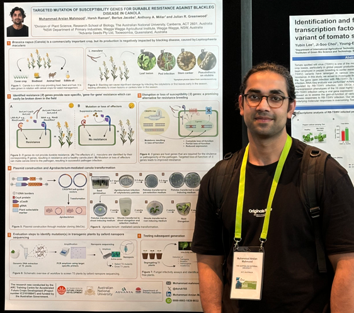 X: @duruk165
X: @duruk165
As a student interested in plant science, I was compelled to participate in the 13th International Plant Molecular Biology (IPMB) congress. This conference is a golden opportunity for students and researchers to showcase Australia’s science on the world stage of plant molecular sciences. I attended as a delegate representing the Australian Society of Plant Scientists (ASPS), which also sponsored my participation. This conference was immensely beneficial, enhancing my research experience, fostering relationships with fellow students, and facilitating interactions with other scientists and researchers. Conferences like IPMB provide a great platform to discuss on-going research with other scientists and get their insights. I was fortunate to be part of this prestigious conference and had the chance to present my research as a poster. This gave me the opportunity to discuss my work and establish collaborations with other labs. I am deeply grateful to ASPS to giving me a travel award to attend IPMB Congress and would encourage all researchers and students to participate in future conferences. These events provide a crucial platform for engaging with fellow scientists and students.
Student contribution
Zane Marks
PhD candidate, University of Adelaide
Socials: Linkedin
Seed priming is the exposure of seeds to an external agent to promote germination, abiotic stress tolerance and physiological benefits to plants1. Several types of priming exist including Nutri-priming (the use of micro or macro nutrients)2, Redox-priming (the use of an oxidative agent)3 and Hydropriming (the use of water as the agent). As a part of my PhD project, we are exploring these priming methods, both separately and in combination, in the re-emerging crop industrial hemp (Cannabis sativa). Industrial hemp is a fibre, flower, and seed crop recently reintroduced to Australia with many states making progress towards implementing the crop on a larger scale4. We investigated the cultivar Han Ne and documented how seed priming affected plant growth and productivity under drought stress conditions. It was observed that there was a significant difference (p<0.001) in seed yield and harvest index when combination primed compared to priming with water (hydropriming) under well-watered conditions. Further analysis on the seeds produced will help to establish whether there was any impact on seed quality, nutritional profiles, and stress tolerance. In future studies we aim to investigate what the underlying mechanisms of seed priming are in hemp and how they contribute to desirable phenotypes. We hope through this study that we can develop an accessible tool set to improve hemp performance for at home growers and farmers alike.
References:
- Farooq, M. et al. Seed priming in field crops: Potential benefits, adoption and challenges. Crop and Pasture Science 70, 731–771 (2019).
- Ali, N. et al. Micronutrient seed priming improves stand establishment, grain yield and biofortification of bread wheat. Crop and Pasture Science 69, 479–487 (2018).
- Hussain, S. et al. Redox priming alleviates dormancy and improves salinity tolerance of seeds and seedlings of medicinal halophyte Zygophyllum simplex L. Journal of Applied Research on Medicinal and Aromatic Plants 30, (2022).
- Schultz, C. J. et al. Consumer and health-related traits of seed from selected commercial and breeding lines of industrial hemp, Cannabis sativa L. Journal of Agriculture and Food Research 2, 100025 (2020).
Editors’ notes:
Look out for the next Phytogen edition in late August! In the meantime, please keep your eyes open for the local ASPS meeting that will happen in each state/territory in Australia and New-Zealand! Registrations and abstract submission will open soon…
“If you think in terms of a year, plant a seed; if in terms of ten years, plant trees; if in terms of 100 years, teach the people.”– Kong Qiu (Confucius, 551 BCE- 479 BCE), Chinese philosopher.
Newsletter written and edited by Lucas Auroux, Dr. Razlin Azman and Dr. Janet Wheeler.
